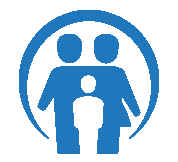Knowledge of Languages, Wellbeing, Transportation and Road Safety
Chap. 6
In this year's report, we included information on knowledge of languages, wellbeing , transportation, and road safety based on the 2021 edition of the Central Bureau of Statistics (CBS) Social Survey.
Languages
Over the last decade, there has been a noticeable rise in the percentage of ultra- Orthodox Israelis who list Hebrew as their mother tongue (75% in 2022, compared with 69% in 2011). Just 10% of ultra-Orthodox respondents report Yiddish as their mother tongue,, down from 13% in 2011. With regard to knowledge of English, just 37% of ultra-Orthodox Jews reported having a command of English, compared with 68% of other Jews.
Satisfied with various factors, by population group (%)

Indicators of Personal Wellbeing
The data reveal that by objective indicators, the situation of the ultra-Orthodox is worse than that of other Jews, while according to subjective indicators, they are better off.
On the objective indicators, we see that 47% of ultra-Orthodox Israelis report having difficulty with covering their household expenses, compared with 36% of other Jews. The ultra-Orthodox also report less participation in various leisure activities: 19% said they had attended arts, cultural, or sporting events in the last year, compared with 39% of other Jews. Similarly, 24% of the ultra-Orthodox had taken part in group activities, such as singing or sport, in the last year, compared with 32% of the rest of the Jewish population.
By contrast, the subjective indicators assessed in the Survey, reveal that 82% of ultra-Orthodox Israelis described their emotional and mental state as "very good", compared with 58% of other Jews. The ultra-Orthodox also scored higher on satisfaction indicators: 61% ranked their satisfaction with life as being at the highest level, on a scale of 1–10, compared with just 24% of other Jews. Similarly, 51% of ultra-Orthodox Jews are satisfied with their personal relationships, compared with 32% of other Jews.
Satisfied with various factors, by population group (%)

Ultra-Orthodox respondents also suffer less from negative feelings: 18% reported experiencing feelings of loneliness (at some frequency or other), compared with 32% of other Jewish Israelis, and 29% reported feeling depressed (at some frequency or other), compared with 45% of other Jews.
Transportation and Road Safety
According to the Social Survey, road safety among the ultra-Orthodox population is better than among the rest of the Jewish population: 76% of ultra-Orthodox respondents reported feeling safe as pedestrians, compared with 64% of other Jews, while 76% of the former feel safe as passengers, compared with 62% of the latter.
Feel safe on the roads, by population group (%)

The ultra-Orthodox also worry less about accidents (57%) than do other Jews (79%). According to the Survey, ultra-Orthodox Israelis commit fewer traffic offenses. For most of the traffic offenses assessed, the share of ultra-Orthodox respondents who report having committed them in the last year was lower than that of their other Jewish counterparts. There were relatively large differences when it came to reading texts while driving and driving above the speed limit on intercity roads (for both, 18% of ultra-Orthodox versus 28% of other Jewish respondents). Smaller differences were reported for driving above the speed limit on urban roads (ultra-Orthodox, 60%; other Jews, 63%) and for driving while tired (41% versus 44%, respectively).
Driving offenses committed in the last year, by population group (%)












